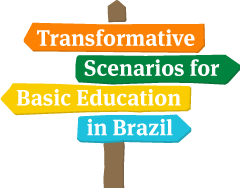Introduction
In the challenging context after the approval of the 2014–2024 National Education Plan – NEP (Plano Nacional de Educação – PNE), the Transformative Scenarios for Basic Education in Brazil represent a collective exercise in analyzing the existing situation and creating possible futures for Brazilian Basic Education over the next 17 years. This exercise was based on a dialogue between diverse political perspectives, many of which defended opposite agendas during the development and approval process of the National Education Plan (NEP) in the National Congress.
Founded on an innovative methodology that was internationally put to proof on addressing complex realities and issues, the Scenario construction workshops brought together 41 people from several public and private institutions, organizations, networks and civil society movements. Thirty others were interviewed and enriched the process with their input. The vast majority of the group consisted of people whose lives were notoriously dedicated to Brazilian education.
Based on the premise of viewing education as a basic right, the dialogue among the different – and often conflicting – perspectives, did not have the building of a negotiated pact or a common agenda among participants as its ultimate goal. Quite to the contrary, the development of the Scenarios for Basic Education became a meeting point and a place for active listening that was never meant to minimize conflicts or differences.
The process was also built on the understanding that public instances of social participation and control such as the National Education Conferences, which were hard-earned by the Brazilian society, are the legitimate forums for the mediation, negotiation and construction of an agenda to effectively influence educational policy. And from those instances and broad, democratic and public processes should arise the agenda to effectively guide Brazilian educational policy, ensuring the human right to education for all.
The scenarios are not predictions or desires. They express possibilities, challenges, warnings and risks for Brazilian education. They do not merely depict a vision of the future. In fact, the four scenarios presented here have been among us for a long time. They are “old friends”, perspectives in dispute within the complex and unequal reality of education in Brazil, each of them present with greater or lesser force depending on the political context.
We hope that this collective exercise will contribute to enriching and stimulating public debate on Brazilian Basic Education in different forums – from schools and communities to society at large, going beyond the issues, possibilities, and even beyond the scenarios drafted by this group of people at this time in the country.
The exercise contained in the creation of the scenarios did not intend to offer answers nor to state truths, but rather to serve as input and as a provocation to spark other analyses, reflections, conversations and disputes, to enrich the political debate and broaden the scope of those working to create the future of Basic Education in our country.
Ação Educativa (Educational Action) – Denise Carreira
Campanha Nacional pelo Direito à Educação (National Campaign for the Right to Education) – Daniel Cara
GIFE (Group of Corporate Institutes and Foundations) – Andre Degenszajn
Todos pela Educação (All for Education) – Maria Lucia Meirelles Reis
UNDIME (National Association of Municipal Education Managers) – Cleuza Rodrigues Repulho
Members of the Convening Group for the Transformative Scenarios for Basic Education in Brazil Project.
In 2014, a group of diverse stakeholders from the field of education in Brazil – civil society organizations, social movements, government, international organizations, key opinion leaders, corporate institutes and foundations, trade unions, teachers, school principals, parents, students and members of the academia – got together to think about the future of Basic Education in Brazil.
The Scenarios Team expressed their visions about the present and the future through interviews, workshops and virtual exchanges and, together, they created a set of four possible scenarios for the future: the Transformative Scenarios for Basic Education in Brazil, 2032.
The team gave the scenarios names inspired by birds found in Brazil: Canary, Hummingbird, Peregrine Falcon and Sparrow.
The scenarios
news
Follow updates and news on the project. Like, share and comment on our Facebook page.
Problem displaying Facebook posts. Backup cache in use.
Click to show error

